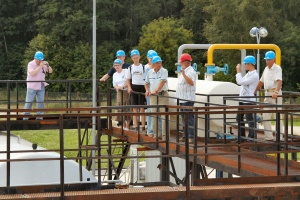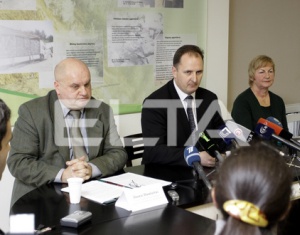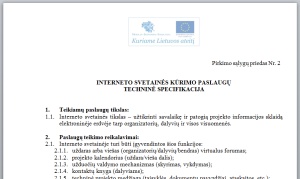Community Relationship Management is a rather niche segment of Public Relations, nevertheless it requires deep understanging of target audiences, long-term planning and consistent implementation. At the same time it is a constant challenge to fit communal issues into general corporate development planning. Usually deadlines are too narrow, negative stereotypes prevail in major audiences and budgets reserved are too tight.
Nevertheless PR is a field for a neverending creativity, therefore these are 3 cases from different personal practice and points o view to consider.
Building trust in the oil mining industry
The bigest oil mining company in Lithuania “Minijos nafta” had a long-term strategic challenge – keep opening new wells in the licenced area. Although the licence for oil extraction was in place, nevertheless numerous drilling platforms were desperately needed in order to provide new output for the receeding oil extraction figures in the functioning wells.
As usual, the most difficult part was PAV (lith. Poveikio aplinkai vertinimas) or EIA (engl: Environmental impact assessment) procedure. It requires to assess potential threats, provide necessary safety measures etc. But the most difficult part was mutual understanding and agreement with local communities.
“Minijos nafta” drills oil in the seaside region, where a considerable part of local businesses are related to recreational purposes (local tourism, fishing, summer vacations etc.). Therefore it was a rather frequent issue that local community, it’s opinion leaders sometime were heavily confronting “Minijos nafta” plans to open a new drilling platform.
In the meantime (2004) the seaside recreational field was very dull. Therefore we’ve maneged to organize daily route from Palanga (main holiday location) to visit several functioning drilling platforms. It was a big success – positive media coverage, major communal leaders visiting sites in person, checking all the safety prerequisite and ensuring no potential harm for the environment. In the end all major opponents got an equasion to solve – compare minor negative factors (some noise, some traffic) and lurking benefits (investments, workplaces, finnacial support for local initiatives).
Balancing interests: local community vs. joint business venture
In 2010 the Department of Environment Protection in Vilnius region had a long-term conflict to solve. Conflicting parties were local community of Vilnius city Lazdynai district and joint venture (related to “Icor” group) to build an incineration plant.
The conflict dated back several years and it was basically a political decision, whom should the Department support. At the moment it was rather clear, that Vilnius does need such type of the industry, because solid waste volume was too big and the open air storage facilities cost too much to expand not to mention international obligations to cut volume of dumped waste.
At the same time founding partners of the joint venture had a really bad track record, which was related to the Vilnius central heating company and tails of corruption. Not to mention an ongoing “war on oligarchs” led by the Presidential palace and pointing at the same businessmen.
Formal decision was presented at the press conference, where major media channels provided national coverage. It became a perfect venue to present both negative decision and describe “to do list for the joint venture” in order to receive formal permission in the future. Such a position availed the Department not to become associated as one of the conflicting parties and remain (as institution) impartial, keep construtive dialogue with both parties of the conflict.
Enabling collaboration – community portal
In 2012 a huge national project “Kuriame Respubliką” was started with the help of EU funding in order to raise civil initiatives from local communities. The majority of participants were youth from regional districts, even rural schools.
The project team had a challenge to choose a communication platform in order to connect geographically spread participants (tens of different teams). In the meantime social networks were only gathering momentum, therefore it was not possible to use them as a starting communication point.
The project itself was devoted to the selection of best practices and multiplication of them into other districts, therefore the platform had to collect all data (textual, visual etc.) and make it easy for the project teams to share and collaborate on new initiatives.
It was challenging to specify all the requirements for the platform and its users, when nobody knew who were to be users and what type of projects are to be started. Nevertheless the system built became a perfect library of civic initiatives and provides perfect best practice scenarios for all willing to use them. Although the growth of social networks made the platform less useful for communication purposes, nevertheless it was flexible enough to integrate its content and create a win-win situation.




